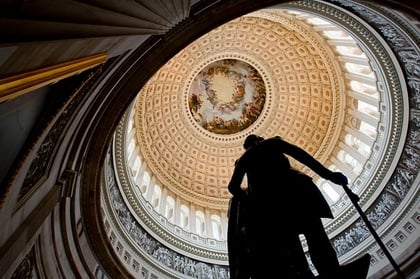(This story has been updated to reflect that the stimulus bill was enacted Friday. The original version of this story was published Wednesday, March 25.)
The $2 trillion stimulus plan enacted Friday includes a temporary waiver of required minimum distribution rules for certain defined contribution plans and IRAs for calendar year 2020.
The provision, according to the bill text, provides relief to individuals “who would otherwise be required to withdraw funds from such retirement accounts during the economic slowdown due to COVID-19.”
(Related: 3 Stimulus Bill Provisions Advisors Should Act On Now: Jeff Levine)
IRA expert Ed Slott of Ed Slott & Co. told ThinkAdvisor that “waiving 2020 RMDs will help lots of people avoid a tax bill on IRA value that has vanished. If not for this relief, 2020 RMDs would be based on the account value at Dec. 31, 2019, when the Dow was around 28,000.”
The RMD waiver also applies to IRA and Roth IRA beneficiaries who have 2020 RMDs, Slott explains. “Advisors should notify clients immediately on this, so they don’t take an RMD they didn’t have to.”
According to the Treasury Department, however, “roughly 80% of people subject to RMDs take more than the minimum because they need the money, so the RMD waiver won’t be much help to these people,” Slott added.
RMDs are also waived for IRA owners who turned 70 1/2 in 2019 and have to take their 2019 RMD by April 1, Slott reminded. “Clients who ignored traditional advice — which I have given too! — about spreading their first two RMDs over two years (2019 and 2020) can now have their first two RMDs waived. If they have already taken any part of their first RMD in 2019, that cannot be undone or waived.”
As to special rules for use of retirement funds, consistent with previous disaster-related relief, the legislation waives the 10% early withdrawal penalty for distributions up to $100,000 from qualified retirement accounts for coronavirus-related purposes made on or after Jan. 1, 2020.
In addition, the bill states that “income attributable to such distributions would be subject to tax over three years, and the taxpayer may recontribute the funds to an eligible retirement plan within three years without regard to that year’s cap on contributions. Further, the provision provides flexibility for loans from certain retirement plans for coronavirus-related relief.”
Slott points out that the “distribution is still taxable, but the tax impact can be softened because it can be spread over three years. The funds can also be repaid within the three years.”









 March 31, 2020 at 10:00 AM
March 31, 2020 at 10:00 AM











